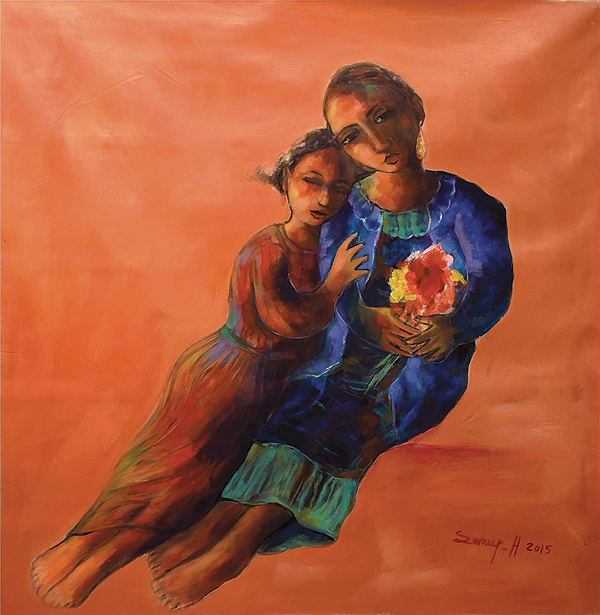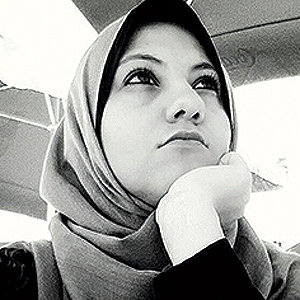
When you are raised as a girl in a conservative Arab society, you have to go through a daily battle of “to be or not to be,” and as you grow, your struggle grows with you. Your life is planned for you before you are born: You are responsible for the household chores and for maintaining your so-called “honor and chastity” until you get married; then you will have kids to whom you will devote your life. The decision to get off that track will cost you much.
My family is religious and conservative to some extent, considers the mingling of boys and girls dangerous, and forbids staying out late at night since our culture disapproves of such activities. I grew up convinced that should I ever make a mistake, I would lose my parents’ confidence, and thus I avoided any disagreement with them – until I passed high school with straight A’s. At that point I felt I had proven that I deserved the trust given to me. This was the first step on my path towards being me.
Initially, my family only reluctantly supported my choice to study law at university. It is the field of which I have dreamt since my childhood, hoping that it would be a source of strength for me as a woman. And so I became locked in a new battle. It is the prevailing conviction in Gaza that the legal profession befits only men. For a female lawyer to work with men is considered shameful. Moreover, society believes that the strong personality required to successfully practice law would make a woman lose her femininity.
Not until my fourth year at university was my family ready to accept the new ideas. They learned that a woman’s potential is greater than proposed by our patriarchal society whose notions kill her spirit and attempt to confine her to obsolete thoughts and traditions. Thus later on they granted my sisters their freedom and gave them their own space. I gave my best and graduated from university, again receiving straight A’s. I had proven that I am not inferior to male lawyers. I gained further respect during my work in the courts, but I did not want to stop there. I have always wanted to change the lives of other women around me and wished to help reduce the violence to which they are exposed.
Practicing law gave me strength of character and enabled me to extend my support to women who are confined within the large prison by which society surrounds us, from childhood on, under various religious and social pretexts disguised as traditions. I cannot keep silent when it comes to women’s suffering. In 2009, while still in law school, I began to defend women’s rights. By 2015, I was able to work in the Shari’a Courts within a project titled Strengthening the Rule of Law in the Palestinian Territory: Justice and Security for the Palestinian People, supported by UN Women under the Sawasya Programme and implemented at the Palestinian Center for Human Rights (PCHR) in Gaza. This experience helped me determine the course of my life. I have realized that despite the ongoing closure and the increasingly difficult challenges, I want to remain in Gaza and play a role in changing the lives of the women who live here. Women are considered as objects to be kept inside the house rather than as persons who are capable of living fulfilled lives and allowed to move in full view of society.

In several judicial cases I have successfully assured women’s rights. I felt satisfied when I was able to bring back their freedom and dignity, at least to some extent, given that women and indeed most people in Gaza are largely illiterate of their basic rights as guaranteed by the law. In other cases, I have failed to overcome obstacles. Beyond the siege and society’s views, unfortunately in fact, the existing law poses the greatest obstacle because our laws are not fair to women.
I have always wanted to write about the cases in which I have failed. I need to share the pain I felt when I was not able to liberate other women from the social restrictions that have been entrenched in our laws. The law makes me stand powerless when a woman seeks divorce for a reason that is not identified in the legal textbooks. For example, the law allows women custody of their children only until the children reach a certain age, without taking into consideration a father’s negative actions, and even when the mother is dedicated and financially able to raise her children. And while the sterility of a woman is a sufficient reason for a man to seek a divorce from his wife, the sterility of a husband is not considered a justification for women to seek divorce.
I am certain that the barriers on the path towards a fairer future for women are not grounded in religion (family law in the State of Palestine is based on the teachings of Islam), but rather in misinterpretation of Islamic traditions. Such misunderstandings are prevalent even among the feminist leaders who have sought to bring about change in recent years. I have noticed the difficulties by which they address the clergymen who are either able to change the law or responsible for facilitating reconciliation between spouses. These men tend to promote the concept that puts “the power in the hands of the man” while requiring the wife to be patient all the time. Society believes that a woman must get married and that the perfect place for her can only be found in her husband’s house where she can take care of her children. She is not supposed to take on a profession, and divorce is always considered disastrous for children.
♦ “I believe in the cause for which I am striving. I grew up in this community, experienced its restrictions, and was released from them one day. I have decided to be part of the movement that aims to lift the restrictions that society places on women who suffer from the poor economic conditions caused by the Israeli occupation, the unstable political situation due to the internal split, and the prevailing social and religious traditions and customs.”
I believe that a woman can sacrifice and endure a certain amount of pain for the sake of her children, but there are other times when she and her children are better off alone. In Palestinian society, women’s rights organizations must take better care of women in all aspects of their lives: legally, socially, and economically – especially if a woman seeks a divorce.
» Ayah Al-Wakeel is a lawyer specialized in the defense of women victims of violence in Gaza. After one year of training at the Palestinian Centre for Human Rights (PCHR), Gaza, sponsored by SAWASYA, the UNDP/UN Women Joint Programme, she continues to work at PCHR in defending the cases of Palestinian women in Shari’a courts in Gaza.


